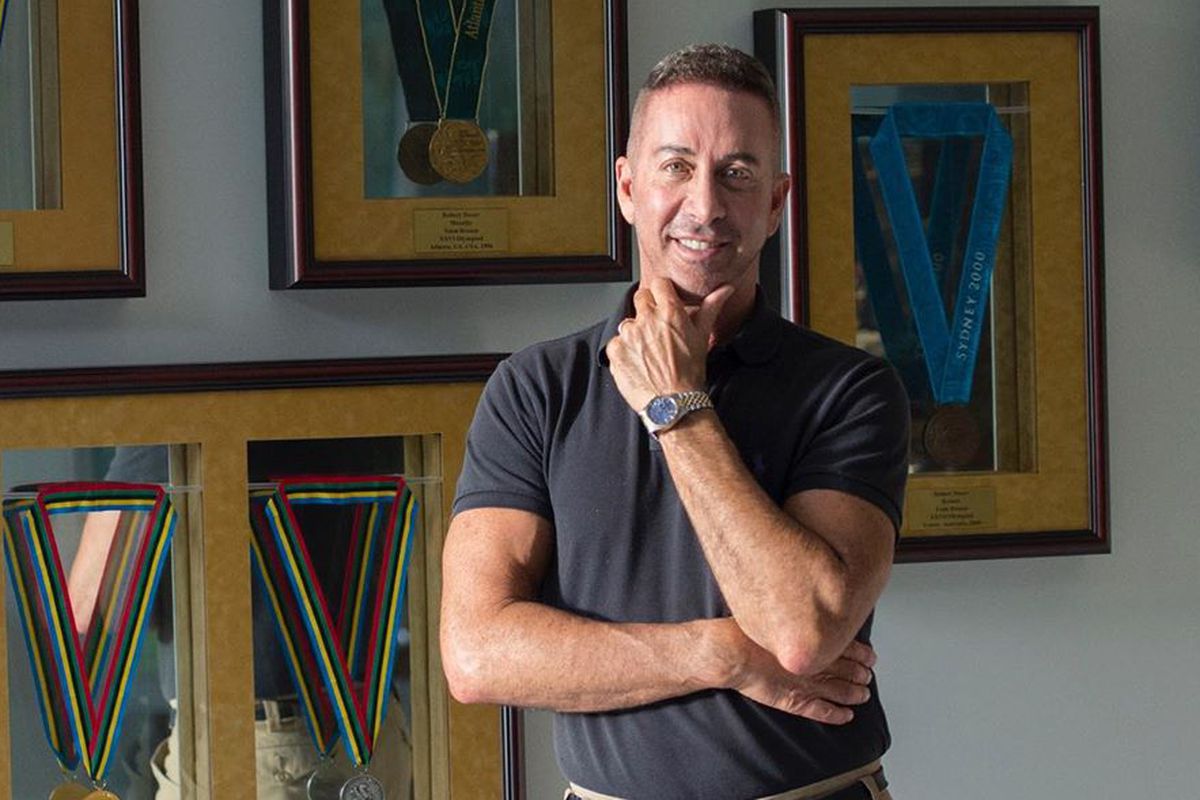By: Zachary Draves
In acknowledgment of the 30th anniversary of the 1992 Barcelona Olympics, Nuts and Bolts Sports will be publishing a series of features on athletes, writers, commentators, etc., reflecting on their time in Barcelona from July 25-August 9.
To kick things off, we are highlighting trailblazing equestrian, Robert Dover. Growing up in Chicago, Robert began riding at the age of 13 after receiving a horse for his Bar Mitzvah. At age 19, he started to specialize in dressage, a French term meaning “training” and the oldest discipline of equestrian. According to the United States Dressage Federation, “its purpose is to strengthen and supple the horse while maintaining a calm and attentive demeanor.”
“The sport displays the harmony between horse and rider performing beautiful dance-like movements around a 20 x 60 meter arena and is judged with both technical and artistic points out of a possible 100%, ” said Dover. “Dressage not only has been a member of the modern “Olympic Family”, it was one of the 5 “Noble Sports” from the Ancient Olympics in Athens over 2000 years ago.
Robert has taken those talents far and wide and became one of the most honored dressage rider in US history. In 1984, he made his Olympic debut in Los Angeles, finishing in 17th place in the individual event, and the U.S. placed 6th in the team competition. In 1987, he became the first American to win the Aachen Grand Prix since 1960, an accomplishment that remains near and dear to him. He returned in 1988 to Seoul, where he placed 13th in the individual event, and the team came once again came in 6th. It was also during those Olympics that he became the first openly gay athlete to compete. Then came Barcelona, where Robert earned his first medal, a bronze in the team competition. He would finish 22nd in the individual.

(Courtesy: The Horse Magazine)
From that point on, Robert would go on to compete in three more Olympics (1996, 2000, and 2004) and captured two additional team bronze medals. He also captured a team bronze at the 1994 World Equestrian Games. Since 2013, Robert has been the Technical Advisor and Chef d’Equipe for The Dutta Corp. U.S. Dressage Team. Under his leadership, the team captured the bronze at the 2016 Olympics in Rio.
After agreeing to participate in this project, Robert shared with NBS in an email interview about his time in Barcelona, the memories that stood out, and how he ranks those games among the others, he competed in.
Can you describe your experience in Barcelona?
Barcelona was a life-changing Olympic Games for me as it not only was the first time back on the medal podiums for our U.S. Team since 1976; it also was my first time winning a medal after having competed in both ‘84 and ‘88. Beyond that, my husband, Robert Ross, as well as my family, were there to watch and root me on, making the achievement even sweeter. The Equestrian venue was excellent, though the weather was extremely hot during the Games and extra care had to be given so our horses would stay healthy and fit for the competitions. We actually did not live in the Olympic Village and chose instead to have rooms which we rented directly across the street in a high-rise apartment overlooking the arena, giving us fantastic views of all the events throughout the two weeks.
What is it like to win a medal and be on the victory podium?
I recall the award ceremony for the Team Medals as incredibly exciting for the four of us as well as our Chef d’Equipe and everyone who was there rooting on Team USA! On the other hand, as the medal was placed around my neck by a member of the International Olympic Committee, I remember lifting it to get a closer look, thinking to myself that this piece of metal stood for decades of work and sacrifice, and the realization that it truly is the road that one must love as opposed to the awards if one is truly to be happy and fulfilled.

(Courtesy: Horse Daily)
What distinguished Barcelona from the other Olympics you competed in?
Barcelona stands out as my first Olympic Games, where I won a medal but also was especially fun because it is a great city that enjoys fabulous food, great culture, nearby beaches, and loads of sightseeing.
How was the environment in the Olympic village?
My team did not live in the Olympic Village in Barcelona, choosing to stay closer to the venue, but we did go in a few times, and it was, as they always are, extremely nice. Great, 24/7 food and everything that anyone could want at your fingertips makes each Olympic Village special for the athletes. It is also amazing to have the opportunity to meet and get to know so many of the approximately 12,000 athletes from around the world. One thinks that the typical Olympian is going to look like a track & field athlete, under 20 and with zero body fat, but the reality is that the average age of Olympians is 34, and body types are totally specific to their sports. Gymnasts are tiny, and Greco Roman Wrestlers are as big as the tables they have dinner at, and there is literally everything in between.
When you look back on Barcelona, how would you sum it all up?
Of the 6 Olympic Games I competed in and the 2 I acted as Coach at, I would definitely put Barcelona in the top 3, along with L.A. and Sydney.:no_upscale()/cdn.vox-cdn.com/uploads/chorus_image/image/66335609/51217921.jpg.0.jpg) (Courtesy: Chris McGrath/Getty Images)
(Courtesy: Chris McGrath/Getty Images)


 NFL
NFL


